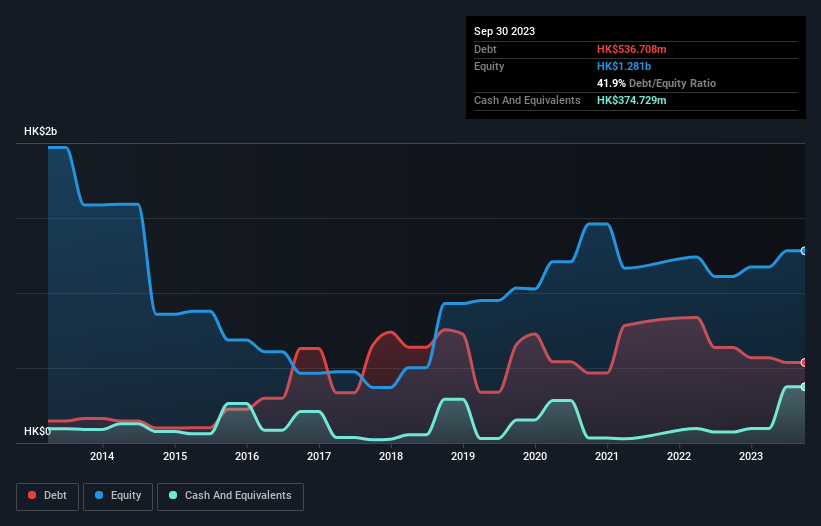- Hong Kong
- /
- Oil and Gas
- /
- SEHK:353
Energy International Investments Holdings (HKG:353) Has A Somewhat Strained Balance Sheet

Warren Buffett famously said, 'Volatility is far from synonymous with risk.' It's only natural to consider a company's balance sheet when you examine how risky it is, since debt is often involved when a business collapses. We can see that Energy International Investments Holdings Limited (HKG:353) does use debt in its business. But should shareholders be worried about its use of debt?
Why Does Debt Bring Risk?
Debt is a tool to help businesses grow, but if a business is incapable of paying off its lenders, then it exists at their mercy. Ultimately, if the company can't fulfill its legal obligations to repay debt, shareholders could walk away with nothing. While that is not too common, we often do see indebted companies permanently diluting shareholders because lenders force them to raise capital at a distressed price. Having said that, the most common situation is where a company manages its debt reasonably well - and to its own advantage. When we examine debt levels, we first consider both cash and debt levels, together.
See our latest analysis for Energy International Investments Holdings
How Much Debt Does Energy International Investments Holdings Carry?
As you can see below, Energy International Investments Holdings had HK$536.7m of debt at September 2023, down from HK$636.1m a year prior. However, it does have HK$374.7m in cash offsetting this, leading to net debt of about HK$162.0m.

A Look At Energy International Investments Holdings' Liabilities
Zooming in on the latest balance sheet data, we can see that Energy International Investments Holdings had liabilities of HK$234.0m due within 12 months and liabilities of HK$573.3m due beyond that. On the other hand, it had cash of HK$374.7m and HK$161.3m worth of receivables due within a year. So its liabilities total HK$271.2m more than the combination of its cash and short-term receivables.
This deficit isn't so bad because Energy International Investments Holdings is worth HK$1.06b, and thus could probably raise enough capital to shore up its balance sheet, if the need arose. However, it is still worthwhile taking a close look at its ability to pay off debt.
We use two main ratios to inform us about debt levels relative to earnings. The first is net debt divided by earnings before interest, tax, depreciation, and amortization (EBITDA), while the second is how many times its earnings before interest and tax (EBIT) covers its interest expense (or its interest cover, for short). This way, we consider both the absolute quantum of the debt, as well as the interest rates paid on it.
Energy International Investments Holdings's net debt is only 1.5 times its EBITDA. And its EBIT covers its interest expense a whopping 11.8 times over. So we're pretty relaxed about its super-conservative use of debt. But the other side of the story is that Energy International Investments Holdings saw its EBIT decline by 9.1% over the last year. If earnings continue to decline at that rate the company may have increasing difficulty managing its debt load. The balance sheet is clearly the area to focus on when you are analysing debt. But you can't view debt in total isolation; since Energy International Investments Holdings will need earnings to service that debt. So if you're keen to discover more about its earnings, it might be worth checking out this graph of its long term earnings trend.
Finally, while the tax-man may adore accounting profits, lenders only accept cold hard cash. So we always check how much of that EBIT is translated into free cash flow. In the last three years, Energy International Investments Holdings's free cash flow amounted to 23% of its EBIT, less than we'd expect. That weak cash conversion makes it more difficult to handle indebtedness.
Our View
Energy International Investments Holdings's EBIT growth rate and conversion of EBIT to free cash flow definitely weigh on it, in our esteem. But the good news is it seems to be able to cover its interest expense with its EBIT with ease. We think that Energy International Investments Holdings's debt does make it a bit risky, after considering the aforementioned data points together. Not all risk is bad, as it can boost share price returns if it pays off, but this debt risk is worth keeping in mind. There's no doubt that we learn most about debt from the balance sheet. But ultimately, every company can contain risks that exist outside of the balance sheet. Case in point: We've spotted 3 warning signs for Energy International Investments Holdings you should be aware of.
If, after all that, you're more interested in a fast growing company with a rock-solid balance sheet, then check out our list of net cash growth stocks without delay.
Valuation is complex, but we're here to simplify it.
Discover if Energy International Investments Holdings might be undervalued or overvalued with our detailed analysis, featuring fair value estimates, potential risks, dividends, insider trades, and its financial condition.
Access Free AnalysisHave feedback on this article? Concerned about the content? Get in touch with us directly. Alternatively, email editorial-team (at) simplywallst.com.
This article by Simply Wall St is general in nature. We provide commentary based on historical data and analyst forecasts only using an unbiased methodology and our articles are not intended to be financial advice. It does not constitute a recommendation to buy or sell any stock, and does not take account of your objectives, or your financial situation. We aim to bring you long-term focused analysis driven by fundamental data. Note that our analysis may not factor in the latest price-sensitive company announcements or qualitative material. Simply Wall St has no position in any stocks mentioned.
About SEHK:353
Energy International Investments Holdings
An investment holding company, engages in the oil production, and oil and liquefied chemical terminal leasing businesses in the People’s Republic of China and Hong Kong.
Solid track record with excellent balance sheet.


